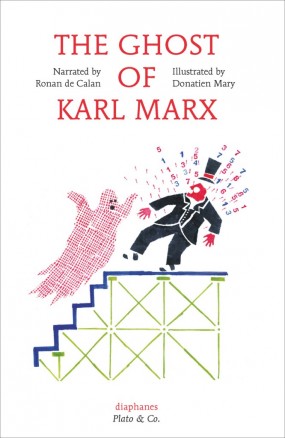'The Ghost of Karl Marx', "a sympathetic introduction to basic Marxism"!
'The Ghost of Karl Marx', "a sympathetic introduction to basic Marxism"!
In september, thanks to the publisher Diaphanes, Marx and Socrates will be available in English. Kirkus already reviewed the two books !
Dès septembre, Marx et Socrate seront disponibles en anglais grâce à l'éditeur Diaphanes. Découvrez la première recension de ces ouvrages par le site Kirkus !
Cheerfully bidding readers to chill (“Don’t be afraid! It’s only a sheet!”), the ghostly Marx rises up to explain the origins of his social philosophy.
The narrator uses the example of Silesian peasants—who, forced off their farms, forced to take up work as weavers in the city, then forced into factories at starvation wages, rebelled (this was in 1844, though the date doesn’t come up here) and were massacred—to explain the desperate need for an alternative to the market system. A succession of capitalist oppressors delivers variations on “it is not my fault; these are the rules of the Market!” as a refrain. Following a visit with ruthless tycoon “Das Kapital,” he proposes a “labor theory of value” and the abolition of private property. In the end, with a promise to come back and “haunt the world, to try and unite it around my radical solutions!” he sails off to pay a call on “Miss Wall Street Panic!” Printed on rough paper and illustrated with garishly colored, posterlike scenes of massed workers, smoking factories, and clouds of numbers and gears, this sympathetic introduction to basic Marxism harkens back to tracts produced during the Soviet Union’s earlier days. Co-published in the same format but with mildly humorous scenes of doll-like figures with huge, staring eyes, Jean Paul Mongin’s account of The Death of Socrates (illustrated by Yann Le Bras and also translated by Street) paraphrases passages from The Apology and other dialogues to present Socratic ideas and methods of discourse.
With its companion, great thinkers viewed from unusual angles—but better as refreshers than first introductions. (Philosophy. 12-15)


